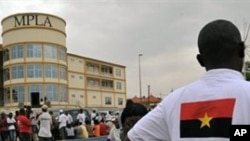Angola's main opposition party has walked out of parliament to protest a new constitution that expands the powers of the presidency. The walk-out occurred Wednesday as the assembly approved the first reading of the new document.
Fourteen parliament members of the opposition UNITA (Union for the Total Independence of Angola) party left Angola's national assembly denouncing what they called an illegal and fraudulent constitutional process.
Nevertheless, the document was overwhelmingly approved because the MPLA (Popular Movement for the Liberation of Angola) controls four-fifths of the seats. The constitution is expected to be approved in a final vote on Thursday and sent to President Jose Eduardo dos Santos for signature.
Analysts said the new constitution enhances the powers of the president who becomes head-of-state, head of government and head of the armed forces. It abolishes the post of prime minister and creates a new post of vice-president.
Under the new document the head of the party that wins the most votes in parliamentary elections is elected president, a process known as the party-list system.
The president may serve two five-year terms which means Mr. Dos Santos could remain in power until 2022.
Presidential elections were expected last year but were postponed until a new constitution could be enacted.
The head of Benguela's Katiava Bwila University, political scientist Paulo de Carvalho, says the new constitution does not represent a setback for democracy and notes that the party list system is used in many democracies in Europe, Asia and South Africa.
He says there are no great changes in terms of political democratization because the new document maintains many existing clauses.
He says it also guarantees freedom of expression and the media. And it outlaws torture and ends the death penalty.
De Carvalho says more important is to have the political will to enact reforms that encourage political liberalization and maintain the process of national reconciliation.
Angola is still recovering from a lengthy struggle for independence and a subsequent 27-year civil war between the MPLA, UNITA and several other parties. The war ended with a peace agreement in 2002 after the death of UNITA leader Jonas Savimbi.
Savimbi ran against Mr. Dos Santos in Angola's first elections in 1992 but the second round was cancelled after he rejected the results and resumed fighting.
A separatist rebellion continues in the oil-rich enclave of Cabinda which is separated from Angola by the Democratic Republic of Congo.
Rebels of the Front for the Liberation of the Enclave of Cabinda two weeks ago killed two members of the national football team of Togo in an attack on the eve of the African Cup of Nations.
Human rights groups say since then authorities have arrested several local dissidents who, they say, have no ties to the rebels.
Angolan Opposition Walks Out as Parliament Votes New Constitution

UNITA party left Angola's national assembly denouncing what they called an illegal and fraudulent constitutional process, but MPLA approved the document








